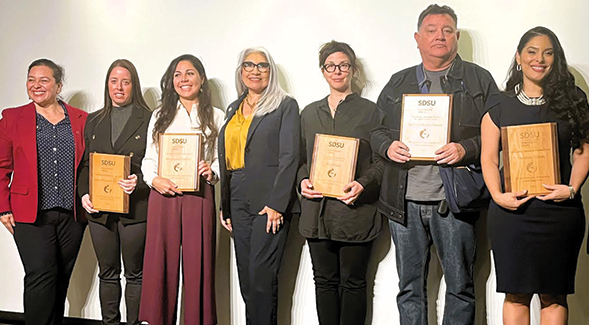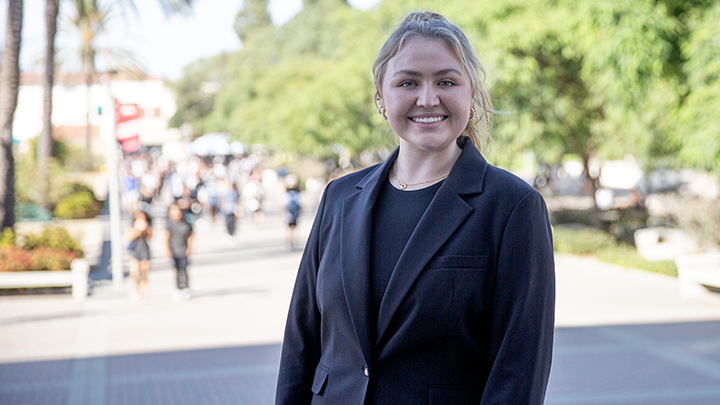Six SDSU Faculty Honored for Global Engagement and Cross-border Research
The Faculty Global Engagement Symposium and Awards on Monday featured presentations showcasing each professors international projects

Six San Diego State University professors won awards for their global research and cross-border education work as part of the university’s celebration of International Education Week Nov. 13-17.
The Faculty Global Engagement Symposium and Awards on Monday featured presentations showcasing each professor’s international projects, including techniques for uncovering dangerous wear-and-tear in aircraft frames, and research on mental health disparities faced by LGBTQ+ people.
In addition, professors at SDSU Imperial Valley were recognized for building bridges to help transborder students succeed in earning degrees and for research/expertise in the cultural importance of corridos: Mexican ballads, often involving injustice, that remain popular today.
An initiative of the U.S. Department of State and the U.S. Department of Education, International Education Week (IEW) highlights the importance of preparing students for a globalized world and attracting future international leaders.
“At SDSU, we don’t limit our recognition to this week,” said Cristina Alfaro, associate vice president for International Affairs. “We breathe it, and we recognize international engagement is a staple for San Diego State University.”
This year’s winners and their awards are:
Arzu Ozkal, professor of graphic design: Outstanding Global Research and Creative Activity
In collaboration with Millie Chen of the University of Buffalo, Ozkal created a video art project centered on the Silk Road, an ancient Eurasian migration and trade route.
“For years, the notion of the Silk Road was about carpets and silk and spice, but we really wanted to focus on the landscape, and we wanted to focus on the people,” Ozkal said.
The result was a pentagon-shaped structure that resembles ancient ruins. It includes an immersive video and sound installation. The project has been displayed at a museum in China.
Margherita Capriotti, assistant professor of aerospace engineering: Outstanding Global Educator
Capriotti’s research focuses on ultrasonic, infrared and other techniques to examine aerospace composite structures for defects without damaging them.
She likened her research to a doctor’s office visit. “What you would like is for the doctor to perform a check without an invasive surgery,” she said. “This is what my research is about, studying non-destructive techniques to assess the health of our aerospace structures.
“It is important to understand the lifecycle of these structures and make sure the aging and environmental effects have not degraded the structure,” she added.
Juan Carlos Ramirez-Pimienta, professor of Spanish and Portuguese languages and literatures: Outstanding Transborder Research and Creative Activity
Ramirez-Pimienta’s research centers on contemporary Latin American literature and culture, including corridos, which emerged leading up to the Mexican-American War.
“In this context, the border is often seen and felt as an open wound,” said Ramirez-Pimienta. “If the border is an open wound, then think of corridos as some sort of cultural Band-Aid that helps with the healing process.”
He continued, “People might say, well, that was in the 19th century. Why do Mexican corridos continue to be so widely popular? And an incomplete but critical component of a very complex answer is they are still needed. Corridos still function as a source of cathartic empowerment for Mexican communities in the U.S. and the borderlands in general.“
Vannessa Falcón Orta; assistant professor, School of Teacher Education: Outstanding Transborder Educator
Falcón Orta is a scholar and organizer focused on addressing trans-border students’ educational disparities. Her research centers on preparing educators and advocating for cross-border studies in the San Diego-Tijuana, Imperial Valley-Mexicali, and Douglas (Arizona)-Aqua Prieta border regions.
As part of her advocacy, Falcón-Orta founded a program where SDSU hosted graduation ceremonies in both the U.S. and Mexico for the first time, so transborder students could celebrate with family members unable to cross into the U.S.
“Without a ceremony like this one, the reality is the event of commencement ends up being a very heartbreaking experience,” she said. “The impact (of the transborder graduation) is transformative.”
Arjan van der Star, research assistant professor of psychology: Outstanding Global Service
Van der Star is a social epidemiologist and public health researcher focused on the mental health of LBGTQ+ individuals and sexual and gender minority populations.
In a video message from Greece where he was presenting his research, Van der Star said sexual and gender minority individuals have a four to seven-fold increased risk of attempted suicide in their lifetimes compared with the general public. His research aims to improve existing thinking models by moving towards design thinking approaches to better understand and mitigate existing risk factors.
“Health is and should be an uncontested public value and universal right.,” he said.
Laura Monsalve Lorente, visiting international scholar: Outstanding International Scholar
A visiting professor from Universitat de València in Spain, Monsalve Lorente’s research is focused on curriculum design and education policy, with a particular interest in gender gaps in science, technology, engineering and math (STEM) and United Nations sustainability goals.
She has been a visiting scholar worldwide, including in the United Kingdom, Sweden, Italy, Cuba, and the U.S. But the experience at SDSU — two years funded by the government of Spain — is longer than most of her other visiting scholar appointments. It ends in 2024.
“I am learning so much about teaching methods and collaborating and interacting with students,” she said. “I have plans, but I would like to stay here longer.”



